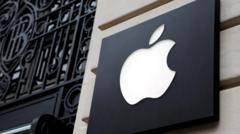In a striking move, a US district judge has referred Apple for a potential criminal contempt investigation after concluding that the tech giant intentionally violated a court order in a prominent antitrust case brought forth by Epic Games, the creator of the popular game Fortnite. Judge Yvonne Gonzalez Rogers addressed the court on Wednesday, claiming that Apple's top executive "outright lied" under oath during proceedings related to the controversial App Store practices.
The case centers around an injunction issued in 2021 aimed at dismantling Apple’s anti-competitive behaviors and allowing developers to use third-party payment options outside of Apple’s ecosystem. In her latest statement, Judge Gonzalez Rogers expressed dismay that Apple continued to act against the injunction's spirit, despite direct orders.
In response to the ruling, Apple has firmly stated it disagrees with the decision and pledged both compliance and an appeal. In a message to the press, a spokesperson indicated their commitment to addressing the court's concerns, reflecting the company's ongoing struggles in navigating regulatory challenges surrounding its App Store policies.
The friction began when Epic Games contested Apple’s revenue model, which involved a commission fee of up to 30% on in-app purchases. Judge Gonzalez Rogers previously ruled that Apple must allow developers to link to their own payment systems, thereby promoting competition. However, in her contempt findings, she indicated that Apple obstructed such competitive measures, adding that the evidence suggested intentional misconduct on the part of the tech titan.
Documents reviewed by the court reveal that Apple deliberately chose paths of action intended to undermine competition, contradicting its professed compliance with the judge's earlier orders. Notably, the judge highlighted that CEO Tim Cook ignored advice urging adherence to court mandates, while Apple's VP of finance, Alex Roman, purportedly misled the court.
Moreover, Judge Rogers illustrated that Apple attempted to sustain its monopolistic stance by imposing a newly-adjusted commission structure, setting charges for off-app transactions that had not existed before. This led to criticisms and allegations of undermining customers’ rights to choose alternate purchasing platforms.
In a turn of events that may reshape the competitive landscape, Epic Games founder Tim Sweeney announced a willingness to reinstate Fortnite on the iOS App Store pending Apple's cooperation in expanding the newly established purchasing framework internationally. His statements on social media suggest a potential thawing of relations with Apple, as he argued against the “Apple Tax” that traditionally burdens developers across the app ecosystem.
As this case continues to evolve, the implications for both Apple and the broader technology sector remain profound, raising crucial questions about market dynamics, consumer rights, and corporate governance in the digital era.
The case centers around an injunction issued in 2021 aimed at dismantling Apple’s anti-competitive behaviors and allowing developers to use third-party payment options outside of Apple’s ecosystem. In her latest statement, Judge Gonzalez Rogers expressed dismay that Apple continued to act against the injunction's spirit, despite direct orders.
In response to the ruling, Apple has firmly stated it disagrees with the decision and pledged both compliance and an appeal. In a message to the press, a spokesperson indicated their commitment to addressing the court's concerns, reflecting the company's ongoing struggles in navigating regulatory challenges surrounding its App Store policies.
The friction began when Epic Games contested Apple’s revenue model, which involved a commission fee of up to 30% on in-app purchases. Judge Gonzalez Rogers previously ruled that Apple must allow developers to link to their own payment systems, thereby promoting competition. However, in her contempt findings, she indicated that Apple obstructed such competitive measures, adding that the evidence suggested intentional misconduct on the part of the tech titan.
Documents reviewed by the court reveal that Apple deliberately chose paths of action intended to undermine competition, contradicting its professed compliance with the judge's earlier orders. Notably, the judge highlighted that CEO Tim Cook ignored advice urging adherence to court mandates, while Apple's VP of finance, Alex Roman, purportedly misled the court.
Moreover, Judge Rogers illustrated that Apple attempted to sustain its monopolistic stance by imposing a newly-adjusted commission structure, setting charges for off-app transactions that had not existed before. This led to criticisms and allegations of undermining customers’ rights to choose alternate purchasing platforms.
In a turn of events that may reshape the competitive landscape, Epic Games founder Tim Sweeney announced a willingness to reinstate Fortnite on the iOS App Store pending Apple's cooperation in expanding the newly established purchasing framework internationally. His statements on social media suggest a potential thawing of relations with Apple, as he argued against the “Apple Tax” that traditionally burdens developers across the app ecosystem.
As this case continues to evolve, the implications for both Apple and the broader technology sector remain profound, raising crucial questions about market dynamics, consumer rights, and corporate governance in the digital era.




















